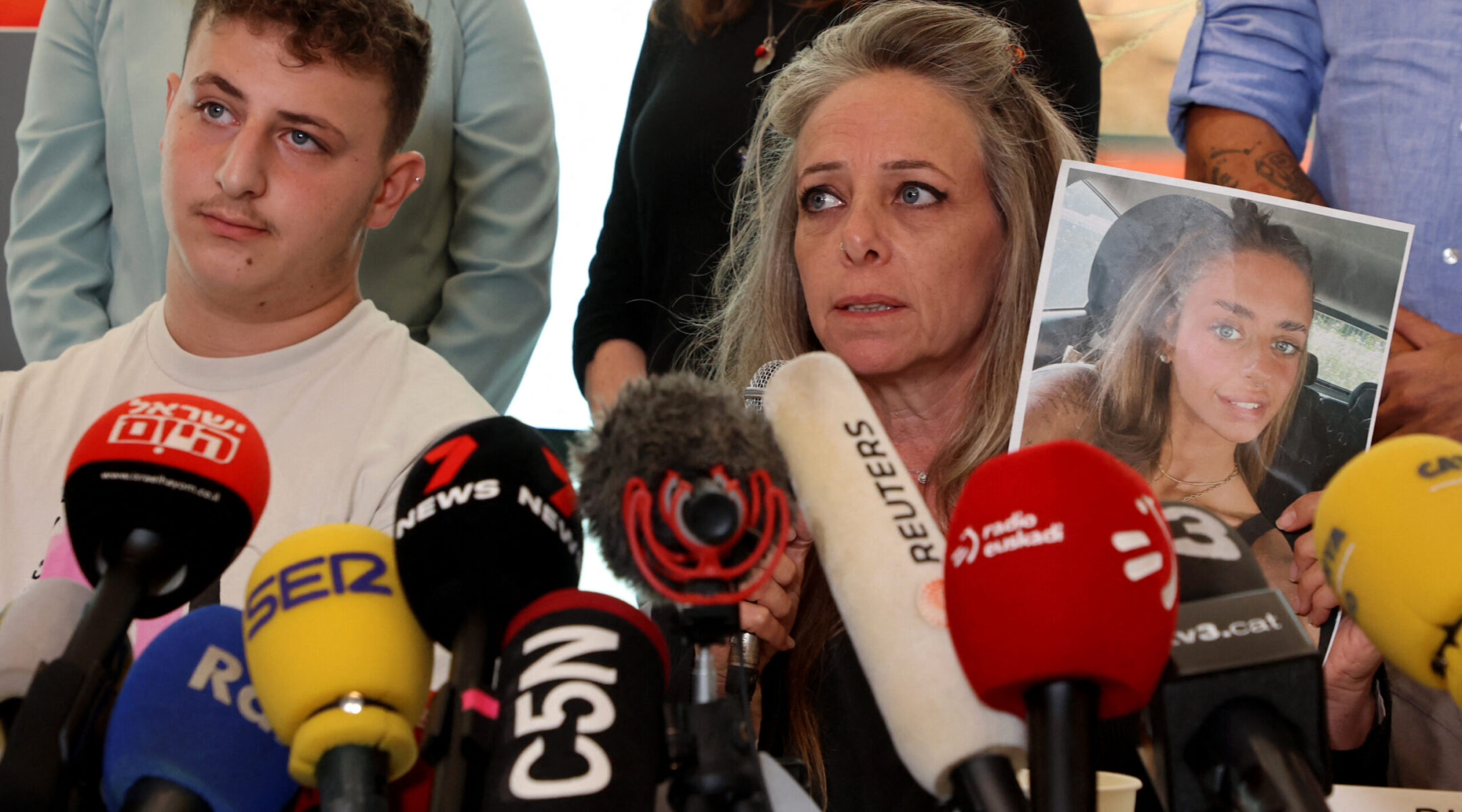TEL AVIV (JTA) — Keren Sherf Shem, whose daughter Mia is among those taken hostage by Hamas in Gaza, expressed both relief and profound concern after a video featuring her daughter was released by the terrorist group on Monday.
“I was overjoyed to see her alive,” Keren Shem told journalists on Tuesday in Tel Aviv. “But I’m very worried about her, I know that she needs medical care and I know about other health problems and that’s the thing that I’m thinking about all the time. Every moment is risking her life.”
Shem’s comments came during a briefing held by the Hostages and Missing Persons Forum, a group that has organized to press for the release of hostages taken during Hamas’ Oct. 7 attack on Israel.
The video, which Hamas titled “Taking care of one of the hostages,” features the 21-year-old Mia, who also holds French citizenship, receiving treatment for an injury to her arm before subsequently addressing the camera directly.
“I’m being cared for, I’m getting medications. I’m only asking to be returned home immediately, to my family,” she said in the video.
The video is widely understood as a move of psychological warfare at a time when Israel is preparing to invade Gaza. Hamas has reportedly offered to release “foreign” hostages if Israel stops bombing in Gaza, according to NBC News; it was not clear whether the offer, which Israel has not indicated it is considering, would apply to dual nationals such as Shem. There are also a number of foreign workers, including from Thailand and Nepal, known to have been taken hostage.
In all, Israel says it has notified the families of 199 hostages that their loved ones are in Gaza. Hamas says other groups operating in the territory are holding about 50 additional people.
The video, which Hamas released on Monday, marked the first proof of life for any hostage since the day of the attack. But the New York Times reported that an examination of the video file’s metadata suggested that some of the footage was captured at least six days prior.
“She looked very terrified,” Keren Shem said. “I can see that she is saying what they tell her to say, but I can see that she’s stable. I didn’t know that she is dead or alive until yesterday.”
Shem said she had cycled through many emotions since viewing the video.
“I started to shout, I fell to the floor and to scream, I didn’t even know what to think, I saw my baby and then we started to sing and to cry, ‘Wow! She’s alive!’ We were so happy, and then I started to feel scared. It was a rollercoaster. It still is.”
The press briefing, which took place in both Hebrew and English, was also attended by the head of the Shin Bet security agency head Yaakov Perry, and Hagai Levine, head of the medical team, both of whom are working with the families of the hostages.
Some relatives of hostages have criticized the Israeli government for not publicly taking more aggressive steps to rescue their loved ones. Answering a journalist about the Israeli government’s role in the aftermath of the attack, Keren Shem said she was optimistic.
“I’m confident that Israel will do all they can to bring Israel home,” she said.
Shem said she was appealing to the international community to advocate for the Israeli hostages.
“I am begging the world to bring my baby back home. She only went to a party to have some fun and now she’s in Gaza and she’s not the only one,” she said. “There are many children, and babies and Holocaust survivors that were kidnapped and their houses were burned. This is a crime against humanity and we should all gather and stop this terror and bring everybody back home.”
To her daughter, Shem delivered a different message, even as she could not be certain that Mia would hear it.
“My message to my daughter is that I love her so much and I miss her so much,” she said. “All these days I just thought about hugging her when she comes home and that’s what keeps me strong and focused.”
JTA has documented Jewish history in real-time for over a century. Keep our journalism strong by joining us in supporting independent, award-winning reporting.






